
Share Your Story
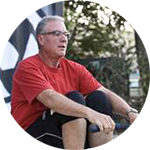
A strong sense of community built around the goals of fitness is one reason Bob fell in love with CrossFit, a high-intensity form of exercise. His journey toward developing a rigorous CrossFit regimen began after years of struggling with weight gain as well as complications from a colon cancer diagnosis in 2008 and chemotherapy and surgery that eradicated his cancer, but left him with neuropathic pain in his hands and feet.
“I was told that I should not and could not [do any vigorous exercise] because of the neuropathy and that walking with some light yoga was sufficient,” he said. He assumed his physicians were right, because at the time, “I wasn’t able to balance myself, jump, and do all the things that are part of exercising.”
His daughter urged him to take CrossFit classes. While the exercise leaves him feeling “tired and winded, once I’m done, I feel like a million bucks,” he said. He noted that he overcame the neuropathic pain in his feet by increasing the frequency and intensity of the exercises in “baby steps, and not pushing too hard at first.”
Today, as a result of regular exercise and proper nutrition, Bob is 42 pounds lighter and has been able to discontinue most of his cardiovascular and neuropathic pain drugs. “I’m now more stable on my feet, more confident, and I make better decisions at work,” he added.
Read more about life-changing fitness in ASHP InterSections.
Robert Weber, Pharm.D., M.S., FASHP, Chief Pharmacy Officer at the Ohio State University Wexner Medical Center in Columbus, Ohio
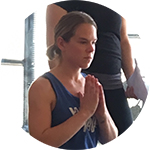
Christina started practicing yoga roughly 7 years ago, an interest she developed when she began her first post-residency pharmacy supervisor position and fell into the trap of working too much. “Things went out of balance,” she said. “Yoga was something that I could commit to beyond work.” Over the years, Christina has learned to enjoy not only the physical aspects of yoga but also its inward, meditative focus.
Yoga has also added another layer of meaning to her life, she said, as she recently completed a hot yoga teacher training program so that she can share her passion for the practice with others.
The 200-hour training program included learning about human anatomy, how to address common ailments that yoga practitioners face, as well as studies in yogic breathing, nutrition, and chakra theory. A chakra is a center of spiritual power in Hindu thought.
“Being part of any community – including the yoga community – can be an antidote to the pervasive isolation and loneliness that we see in today’s society,” Christina said.
Read more about life-changing fitness in ASHP InterSections.
Christina Martin, Pharm.D., M.S., CAE, Director, New Practitioners Forum, ASHP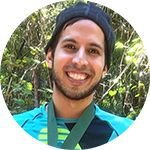
Throughout high school and college, and into pharmacy school, Juan didn’t do any physical activity. Instead, he spent his time studying, developing poor eating habits, and loading up on caffeine. Then, during his third year of pharmacy school, his father passed away from a fatal heart attack at age 50. It was just the wake-up call he needed to make a change.
Juan signed up for a half-marathon, giving himself a year to train. He joined a local gym and began jogging and walking on the treadmill for 15 minutes. Once he had enough endurance to run for an hour, he joined a local running club. His first outdoor run with them was for four miles, and he was so fearful of getting lost that he forced himself to run faster to keep up with the others. A few months later, he ran his first race, a 7K. The next spring, he completed his targeted half-marathon in under two hours.
Then, he said, “I got the bug.” Today he’s into ultrarunning, defined as anything more than a 26.2-mile marathon. He completed a 50-mile race in just under 11 hours and is now training for his first 100-mile race.
Running, he said, “really helps with stress relief and overall health. It’s very mental. It’s a time to get away, get a break, and it helps me get in the zone.” He is currently establishing a running group for pharmacy students.
Learn more about ASHP members who run to relieve stress in ASHP InterSections.
Juan Hincapie-Castillo, Pharm.D., Ph.D., M.S., Assistant Professor at the University of Florida College of Pharmacy in Gainesville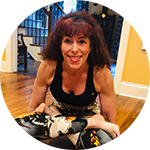
About three years ago, a pharmacy colleague suggested that Seena should try yoga. She took advantage of an introductory special offered by a local yoga studio. Within a few sessions, she was hooked, going to class several times a week. She has since become an instructor who teaches yoga to residents and college students at the studio where she trained. She also teaches yoga at national conferences.
“I was completely amazed by the impact it had on my mindset and my stress levels,” she said. “It helped quiet what I call the ‘monkey mind’ and focus on the present moment. This was exactly the mind-body connection and stillness that I was searching for that I couldn’t find through other group conditioning activities.”
Learn more about how Seena and other ASHP members became certified yoga instructors in ASHP InterSections.
Seena Haines, Pharm.D., FASHP, BCACP, Professor and Chair of the Department of Pharmacy Practice at the University of Mississippi School of Pharmacy
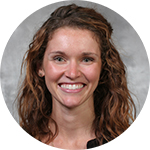
“Every morning at 4 a.m., I fill up my resilience bucket by first reflecting on what I am grateful for from the previous day. After that, I go to my local fitness studio. Exercising strengthens me both physically and mentally.
Throughout the day I try to spread my positive energy with my residency family. I’ve even developed Wellness Wednesday, where I send an email focused on physical, emotional, intellectual, spiritual, or financial health with the hope of providing others with an uplifting moment and helping them build resilience.”
Shannon Kraus, Pharm.D., BCPS, PGY1/PGY2 MS/Pharmacy Administration Resident at Riverside Methodist Hospital
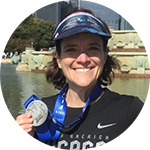
Kim started running over a decade ago as a means to help lose weight after the birth of her second child. It’s helped her in numerous ways.
“There’s a physical benefit obviously,” said Kim, a member of ASHP for over 20 years. “It keeps the weight down, it’s good for bone strength, and my heart rate and blood pressure are super low. It’s great spiritually, and has given me a lot of time to reflect on the beauty around us.”
Moreover, it’s helped her socially. She estimates that about 75 percent of her friends are people she has met through a running club. Five to six mornings a week, Kim meets the group for 5:30 a.m. runs. During the week, they might go four to eight miles, while on weekends they tackle eight to 20 miles for those training for a marathon.
After the runs, they socialize during their cool downs over coffee or sports drinks. She also has gone to group dinners and movies with her running friends and traveled with them to cities like Chicago to run marathons.
“I’m a morning person, and one of the reasons I like to run then is I feel like it keeps me more active, engaged, and alert at work because I’m not really a coffee drinker,” Kim said. “It naturally wakes me up and gets me ready to tackle the day to work with my team, take care of my patients, and teach.”
Kim also has met running friends through ASHP. They often meet early in the morning to run and then attend conferences together, or look for local races occurring in the cities where meetings are held. “Every time I travel to a pharmacy meeting, I look to see if there’s a race anywhere around, just so I can get my miles in,” she said. “It helps me sit through a longer meeting better.”
Learn more about ASHP members who run to relieve stress in ASHP InterSections.
Kim Benner, Pharm.D., BCPS, FASHP, FPPA, Professor of Pharmacy Practice at Samford University in Birmingham, AL, and Pediatric Clinical Specialist at Children’s of Alabama
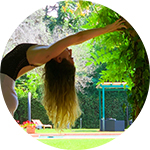
Hala Hijazi found yoga as a teenager when her aunt suggested she try it to help manage the stress surrounding her ulcerative colitis. She noted that practicing yoga helped her survive her pharmacy residency and today makes her feel more balanced in her life, work, and spirituality. A breathing technique called pranayama, also known as the life force, helps her get into a meditation state.
“I learned to slow down, be more patient, and focus more,” Hala said. “Now, when I have a few tasks to do, I don’t become stressed-out about them. I prioritize and take it task by task.” Hala teaches yoga classes at her home, a local studio, and online.
Learn more about how Hala and other ASHP members became certified yoga instructors in ASHP InterSections.
Hala Hijazi, Pharm.D, clinical staff pharmacist at King Faisal Specialist Hospital in Riyadh, Saudi Arabia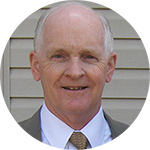
"I've been a pharmacist for 41 years, 37 of those in management positions," explained Ronald. He found himself dealing with issues that all pharmacy managers experience: personnel issues, increased regulation, budget cuts, and the expectation to do more with less.
“I was becoming more tired and irritable and experienced classic symptoms of burnout. I ate lunch at my desk every day and took work home regularly," he said. "I was having trouble sleeping. I realized I needed to slow down and take better care of myself.”
Ronald tried a meditation class, hoping it might help his sleep problems and stress level without medication or therapy. “The result? I find it does!” he said, “The biggest surprise was the level of physical and emotional relaxation. I felt like a whole different person after the meditation – like a weight was lifted off my shoulders. I walked out so much more slowly – no longer in a rush.”
Read more about Ronald’s meditation journey in ASHP InterSections.
Ronald Lay, M.S., R,Ph. former Director of Inpatient Pharmacy at Penn State Health Hershey Medical Center, in Hershey, PA.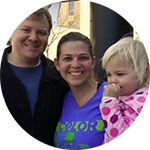
For Lisa, running has been a tool to help maintain high energy and a positive outlook in stressful situations. Three mornings a week, she rises at 5 a.m. to run a 5K route through her neighborhood.
“I see part of my role [as a pharmacist] as not only to provide safe and effective prescription processing and patient counseling, but to maintain a certain level of positivity. I feel like exercise is key to that—I do it as much for me as for my team,” she said.
Learn more about ASHP members who run to relieve stress in ASHP InterSections.
Lisa Padgett, Pharm.D., BCACP, Community Pharmacist in of Raleigh, N.C.
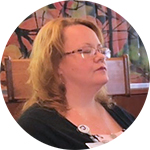
Lisa teaches a weekly meditation class to pharmacists, nurses, and other hospital employees in her hospital’s chapel. She helps them focus first on their posture, then their breathing and heartbeat, finally linking heart and breath. She encourages them to ignore the clanking of dishes from the cafeteria, the patter of feet in the hallway – to instead focus on concentrating on their breath and heart.
“When you get your breathing in rhythm with your heartbeat it creates physiologic coherence. Conscious breathing helps you feel more relaxed, reduces blood pressure, and slows the heart rate,” she said.
Read more about Lisa’s meditation class in ASHP InterSections.
Lisa Hanlon Wilhelm, BS.Pharm., R.Ph., Medication Safety and Compliance Specialist at Penn State Health Hershey Medical Center in Hershey, PA.
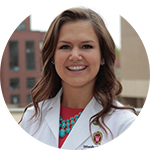
“I can’t always control the challenges that can lead to symptoms of burnout but I can control my attitude toward those challenges.
A philosophy that’s helped me bounce back from a bad exam grade, get through long hours of studying, learn from mistakes, and ultimately excel in my program is Hal Elrod’s 5-Minute Rule, which says it’s OK to be upset, angry, frustrated, or negative when something unfavorable happens to you, but you get only five minutes to feel that way. So, I allow myself five minutes to feel those emotions, but then I force myself to put it behind me, learn from it, and move on with my day with a positive attitude and a smile on my face.
I also prioritize activities that make me happy and recharge my overall well-being, like running outside in the fresh air and spending time with friends and family.”
Sydney Stiener, Student Pharmacist and Pharm.D. Candidate (May 2019), at the University of Wisconsin-Madison School of Pharmacy

As new practitioners and twins, we are entering a critical phase in our career. Our actions, feelings, and decisions can have a substantial impact on our ability to prevent or recover from burnout. The rigors of residency, such as an increased workload, sleep deprivation from long duty hours, managing conflicts, or meeting high expectations, can lead to burnout. It's far more than cumulative stress, but rather, the transformation of a once vibrant, highly-functioning, and enthusiastic individual into one overpowered by emotional exhaustion, depersonalization, and denial of self-worth. The consequences of burnout can endanger an individual's well-being, sociability, productivity in the workplace, and ultimately negatively impact patient care. Recognizing the substantial impact of burnout on our profession has given us the personal drive to inspire a dialogue amongst new practitioners.
Combating burnout starts with the recognition that stress, which is the significant risk factor for burnout. It is something we all inevitably experience in our day-to-day personal and professional lives. The attitude and strategies we use to cope with stressful events, either in a passive/defensive way or an active/assertive manner, enables us to guard ourselves against experiencing burnout. We have created several strategies to build resilience and prevent burnout such as combating mental exhaustion with exercise and avoiding depersonalization by integrating our creative talents into the workplace. We defeat feelings of reduced self-accomplishment by developing a support system to provide guidance and encouragement.
During our first semester of pharmacy school, getting used to the rigorous curriculum and weekly exams made it difficult for us to schedule time for our fitness plans. We certainly have all experienced times when we are buried in our work or stuck studying to the point of mental exhaustion while letting our hobbies get pushed aside. Undoubtedly, this was happening to us. When we looked in the mirror, we realized that staying fit and healthy is just as important as investing in our future careers. As former athletes, exercise serves as a therapeutic outlet. We can put our brains to rest, focus on the mind-body connection, and put our endurance and strength to the test.
Establishing a self-care routine and remaining engaged in these activities outside of the workplace are vital strategies for maintaining healthy work-life integration. The following are our prescriptions for combating burnout:
- Rx#1: Take the time to put your paperwork, cellphone, and laptop aside, and let your mind rest by fulfilling the hobbies that bring you pride and joy!
Admittedly, when starting our intern positions, the busy atmosphere, rigid policies, and limited job duties negatively impacted our job satisfaction. A lack of recognition for a job well-done led to feelings of emotional detachment, which describes depersonalization. It is an element of burnout that can be prevented through active engagement. By getting involved, setting goals, and using the necessary resources in our workplaces, we were better able to perform our tasks joyfully and efficiently.
We accept that we will face moments of frustration in tedious tasks or inflexible policies. However, decided we will not allow these external forces to outnumber the moments of fulfillment that our careers bring. We set goals to improve our medical writing skills and integrated our design, thinking into our hospital intern positions. We proactively sought involvement in our institutions' monthly newsletters and designed infographics to support the educational needs of our peers. In our community pharmacy positions, we used our passion for photography to develop resources to promote awareness and provide patient education on naloxone.
- Rx #2: Passion and engagement are catalysts for success. Don't forget to bring your unique skills forward to keep your job satisfaction and well-being at their best.
Building robust personal and professional support systems have been critical to avoiding social isolation, withdrawal, and feelings of self-doubt from burnout. As twins, we are blessed to have one another to confide in, share our concerns, and collaborate on devising solutions to the challenges we face.
Between our family, friends, mentors, and colleagues, the healthy relationships we maintain at home and within our profession provide multiple avenues for support, guidance, and advice. These positive connections help us recover from setbacks, learn from our failures, and remind us to celebrate our successes.
- Rx #3: Surround yourself with the dreamers, doers, and believers. Find those who see the greatness within you, even when you falter and do not see it in yourself.
ASHP advocates building a mindset of resilience. We often think about this quote: "Today, do not let setbacks define you, but overcome adversity with optimism, tackle problems head-on, and see challenges as new opportunities to grow."
We know this residency year will be a long rollercoaster, intertwined with bumps in the road. However, we are ready to jump in, buckle up, and embrace the ride. We know this is a necessary journey to shape us into the clinicians we aspire to become.
ASHP's well-being and resilience resources are invaluable tools to ensure that our physical, mental, and social health readily align and remain strong. We look forward to a rewarding and fulfilling pharmacy career while preventing and combatting burnout.
Brooke Barlow, PGY1 Pharmacy Resident, University of Kentucky HealthCare
Ashley Barlow, PGY1 Pharmacy Resident, University of Maryland Medical Center
 “At the end of the day, my decisions impact the care provided to a sick child and their family. I feel stressed when I am moving from back-to-back meetings and see my inbox piling up. The stress gets more compounded when I physically begin to feel sluggish, tired, lacking energy, or like I'm not in the best physical health.
“At the end of the day, my decisions impact the care provided to a sick child and their family. I feel stressed when I am moving from back-to-back meetings and see my inbox piling up. The stress gets more compounded when I physically begin to feel sluggish, tired, lacking energy, or like I'm not in the best physical health.
We had a saying in my family growing up, which was ‘a healthy mind is a healthy body.’ I didn’t [understand] the value of that statement until I realized that I needed to feel my best to do my best work. I used to love to run—it helped me clear my mind, plan my day, focus, and re-energize. Why not use that to improve both my personal goals and career?
I took on [several] goals for fitness—to pick up running again, partner up with a trainer to learn the technique for Olympic weight lifting, and to work towards completing a half marathon. To keep my motivation up, I identified a fundraising opportunity to rally my work team together in support of my run. We submitted the donation to a charity in support of one of our colleagues who was battling an illness.”
Abhay Patel, Pharm.D., M.S., Pharmacy Manager at Children’s Hospital of Philadelphia
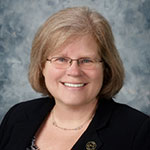
“Life is a balancing act, and it is important to do the best we can do on a daily [basis]. Burnout happens, but if we remember to take time for ourselves, it will definitely help keep burnout to a minimum.
I work at a [small] long term acute care facility. We do not have the bells and whistles of a larger facility, nor do we have an abundance of staff. Last year, our Director of Pharmacy left to follow his passion in a different area of pharmacy. As the lead pharmacy technician and the most seasoned employee, the responsibilities of the day-to-day running of the pharmacy fell onto me.
I knew I needed to create a schedule that would assist in juggling work and home needs. I devoted my time to maintaining the pharmacy to ensure we offered the best pharmaceutical care for our patients. I worked with my personal trainer to find the inner strength to do my best to juggle it all.
Within the pharmacy, we have a very close working relationship. We create and practice a work culture that promotes a family environment. We are supportive of each other's needs and work together to maintain the department.”
Diane Halvorson, R.Ph.Tech, CPh.T., CPST, Lead Pharmacy Technician at Vibra Hospital Fargo and Board member of the North Dakota Board of Pharmacy
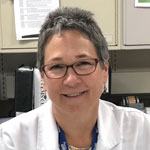
“After working in a retail setting for 19 years, I was feeling burned out by the long hours of standing and the production line mentality. I left that position and found a new job in the hospital setting as a pharmacy manager.
Changing from working 13-hour days to 8-hour days made a big difference. I went back to school get my Pharm.D. at age 48 and a BCGP at age 51. Life long learning is rewarding!
Don't be afraid to leave your comfort zone and try new challenges. I found a much better work environment when I moved into hospital pharmacy. I have established a much more balanced lifestyle between work and family
I love that I work for a company that values my ideas and supports my work for the mission—to serve the community in which we live. We are rewarded for healthy activities such as exercising and eating well, with monetary incentives. The peer-to-peer related challenges are fun to join through the Virgin Pulse app.”
Amy Westmoreland, Pharm.D., BCGP, Pharmacy Manager and Clinical Pharmacist at Carilion Giles Community Hospital
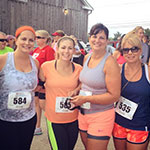 “I feel stressed when I'm faced with multiple deadlines, juggling work commitments, and balancing family obligations. I spend a lot of time on conference calls, WebEx presentations, internal meetings, and on-site meetings with hospitals. This requires travel, and I don't want to miss time with family and friends.
“I feel stressed when I'm faced with multiple deadlines, juggling work commitments, and balancing family obligations. I spend a lot of time on conference calls, WebEx presentations, internal meetings, and on-site meetings with hospitals. This requires travel, and I don't want to miss time with family and friends.
To help reduce stress, I make a list of deadlines and what I want to accomplish during the day. If I have a project or report due, I try to block time on my calendar to work on my deadlines. I also try to batch email review, so I'm not looking at my email constantly. When possible, I limit calls to 30-minutes and face-to-face meetings to an hour to allow more time for other work. I also schedule family/friend events on my calendar to avoid double booking.
I exercise in the morning, either by walking, playing tennis, or pilates. I schedule time with family and friends primarily on the weekends and try to relax in the evening by reading or knitting.
In the past, I took a position as a Vice President in a health system and commuted over an hour to my job. I loved the job but the time away from home and unexpected meetings late in the day led me to leave the position. Eventually, I decided to move into consulting, which offers flexibility even though I do travel several times a month.”
Barb Giacomelli, Pharm.D., M.B.A., FASHP, Vice President of Advisory Services at McKesson RxOVP
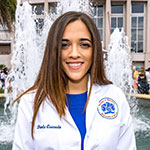 “When I began pharmacy school, I made a promise to myself that I would give every opportunity my full effort. I wanted to expose myself to everything and fully reap the benefits of being a student. This led me to attain three internships, become involved in student organizations, and participate in research projects. However, I was feeling emotionally exhausted, and I [felt] guilty for taking breaks from studying. Even on weekends when I was visiting my family, in the back of my mind, I was thinking of everything I could have been working on.
“When I began pharmacy school, I made a promise to myself that I would give every opportunity my full effort. I wanted to expose myself to everything and fully reap the benefits of being a student. This led me to attain three internships, become involved in student organizations, and participate in research projects. However, I was feeling emotionally exhausted, and I [felt] guilty for taking breaks from studying. Even on weekends when I was visiting my family, in the back of my mind, I was thinking of everything I could have been working on.
To avoid this, I began making more effective use of my time. Making goals while studying helps keep me on track so I can enjoy time off. During my breaks from studying, I began cooking healthy meals, practicing yoga, and going on runs with friends.
To enhance my resilience and well-being, I began taking better care of myself. Using yoga and healthy eating to gain some headspace allowed me to be more effective in my studying and more present with my friends and family. Journaling what makes me thankful each day helps remind me of how fortunate I am to be studying pharmacy. Our campus offers several activities such as a run club and surprise coffee bars to help make the day more positive.”
Darla Quevedo, student pharmacist at the University of Florida College of Pharmacy
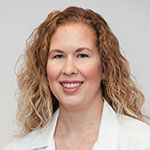 “Early in my management career, I was involved with my department's transition after the hospital's recent acquisition by a larger health system. As a new manager eager to prove my worth, I accepted every assignment. I actually thrived in this environment, but after several months of working at this fast pace, I began to feel very much unlike myself. As the stress and pressures of work mounted, I found that both my work and my personal life were negatively impacted.
“Early in my management career, I was involved with my department's transition after the hospital's recent acquisition by a larger health system. As a new manager eager to prove my worth, I accepted every assignment. I actually thrived in this environment, but after several months of working at this fast pace, I began to feel very much unlike myself. As the stress and pressures of work mounted, I found that both my work and my personal life were negatively impacted.
When I finally recognized my depressed mood, I contacted my hospital’s employee assistance program. I'm very happy that I did—this was one of the best decisions I could have made for myself at the time.
After just a few counseling sessions, I realized that I had been allowing my work to consume me. While I still enjoyed the work, the sheer volume of time I was giving to my role as a ‘pharmacist' was causing me to miss out on the other facets of who I was— ‘wife,’ ‘friend,’ ‘daughter,’ ‘musician,’ and so forth.
I realized that I needed to carve out time to allow those other facets of myself to thrive. I forced myself to step away from work at the end of the day, and I began to plan time for relaxation or exercise intentionally. I scheduled outings with friends and reconnected with my family.
The Cleveland Clinic Health System offers an employee assistance program called Caring for Caregivers. I can't speak highly enough of this service, and I have recommended it to fellow caregivers on many occasions. In addition, the organization provides numerous incentives and support for caregivers’ well-being, including programs for fitness, disease management, and stress management.
Allison Naso, Pharm.D., M.B.A., BCPS Director of Pharmacy at Cleveland Clinic Medina Hospital
 “Finding the balance between having a fulfilling career in pharmacy and the hidden forces of pharmacy burnout is easier said than done. For me, I feel the most pressure is when my inbox messages start to pile up when I am in all-day meetings and unable to respond.
“Finding the balance between having a fulfilling career in pharmacy and the hidden forces of pharmacy burnout is easier said than done. For me, I feel the most pressure is when my inbox messages start to pile up when I am in all-day meetings and unable to respond.
I cope with daily stress by being intentional and laying out my strategy for the day based on my “north star” or what is most important to me. As a leader, my purpose is growing and positioning team members to do remarkable things in advancing the pharmacy profession. I work with my team to help them identify their north star in health care.
On a personal level, every day during the week, I wake up at 4:30 am to go for a run, which is therapeutic for me. During my run, I review my day and layout an action plan for the day that will allow me to the most impactful with my time. My relationship with my wife is one of my top priorities. If I make plans with her, I do everything in my power to make those plans happen. Knowing what is important to you is key to a healthy work-life balance. “
Ryan Mills, Pharm.D., M.B.A., M.H.A., BCPS, Pharmacy Manager at Novant Health
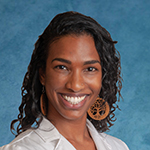 “Through my career as a pharmacist, I felt out of harmony with the healthcare workplace. I felt a disconnect with wellness, not only with our patients but also with our healthcare providers. I saw excessive drinking and chain cigarette smoking; far too many were sedentary or had unhealthy eating habits. I realized that my coworkers were only trying to cope—with the stress, the long hours, and the compassion fatigue.
“Through my career as a pharmacist, I felt out of harmony with the healthcare workplace. I felt a disconnect with wellness, not only with our patients but also with our healthcare providers. I saw excessive drinking and chain cigarette smoking; far too many were sedentary or had unhealthy eating habits. I realized that my coworkers were only trying to cope—with the stress, the long hours, and the compassion fatigue.
It wasn’t until I became a yoga practitioner that I started to embrace wellness beyond fitness and diet. I realized that sleep, stress, and social connection were also required to live well. Yoga allowed me to incorporate equanimity and wellness into all aspects of my life, and it felt necessary to share with my coworkers.
With the generous support of my administrators and institution, I started providing short yoga sessions for free to all Sarasota Memorial Healthcare System employees. I am grateful for the impact I make as a pharmacist in a bustling emergency department, but I also cherish sharing the benefits of yoga with my fellow healthcare workers. It brings me joy to see participants leave feeling rejuvenated and a little closer to the well-being they deserve. Sarasota Memorial Healthcare System offers my yoga sessions, Tai chi, and many other wellness resources through the Health and Wellness Committee.”
Kathryn Samai, Pharm.D., BCPS, Registered Yoga Teacher, Emergency Medicine Clinical Pharmacist at Sarasota Memorial Healthcare System
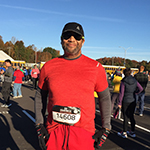 “Being a pharmacist at any time over the last [several] years is part and parcel with excessive stress and workplace burnout.
“Being a pharmacist at any time over the last [several] years is part and parcel with excessive stress and workplace burnout.
In the beginning, I used family time and TV to relieve stress. While useful, they did little to improve my health. About four years ago, I took up running to improve my stamina. It did that and much more!
Running proved useful for clearing [my] cluttered mind. I already had been a typical gym rat, but running improved my performance in the gym too! By coupling [fitness] with flying, tournament bowling, and contemplating a return to tournament chess, a successful work/life balance was achieved! I also realized that I will NEVER, EVER, EVER, let a job or career interfere with the more important task of being there for my family.”
Vincent Earl Pearson, Pharm.D., BCPS, Staff Pharmacist at Fort Washington Medical Center
 In my first semester of pharmacy school, I was beginning to see myself experiencing signs of burnout – I was tired, having trouble concentrating, and feeling more anxiety. I found myself needing to completely change the way I managed my time and how I studied. It became very important to me to stop burnout before it hit and I found a few ways to cope. I now schedule time for myself by putting it on my calendar just like everything else. Every weekend, I pick one day that I take off from anything pharmacy school or organization related. It is my day to do with as I please – whether it is spending time with my husband and my dogs, going out with friends or family, relaxing at home, cooking, or being outdoors – it is my time. I have also started a gratitude journal which allows me to focus on the positives of each day and that makes me feel more energized and excited.
In my first semester of pharmacy school, I was beginning to see myself experiencing signs of burnout – I was tired, having trouble concentrating, and feeling more anxiety. I found myself needing to completely change the way I managed my time and how I studied. It became very important to me to stop burnout before it hit and I found a few ways to cope. I now schedule time for myself by putting it on my calendar just like everything else. Every weekend, I pick one day that I take off from anything pharmacy school or organization related. It is my day to do with as I please – whether it is spending time with my husband and my dogs, going out with friends or family, relaxing at home, cooking, or being outdoors – it is my time. I have also started a gratitude journal which allows me to focus on the positives of each day and that makes me feel more energized and excited.
Autumn Pinard, University of New Mexico College of Pharmacy, Class of 2022
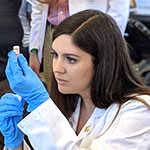 As a pharmacy student, it is often easy to experience periods of extreme pressure and stress. These sentiments struck during the spring semester of my P2 year. As a means to stay connected, I started hugging my fiancé more frequently. This expanded to classmates and I found that the simple act of hugging my loved ones and fellow classmates built resiliency and a sense of camaraderie.
As a pharmacy student, it is often easy to experience periods of extreme pressure and stress. These sentiments struck during the spring semester of my P2 year. As a means to stay connected, I started hugging my fiancé more frequently. This expanded to classmates and I found that the simple act of hugging my loved ones and fellow classmates built resiliency and a sense of camaraderie.
I then took a step back to briefly reflect on what brought me joy in life and school. I focused on the joyful rather than negative moments. Once I identified what brought me joy, I sought out those projects and events within my organizational involvement I was passionate about and found I no longer felt overwhelmed or burned out – instead, my passions and interests rejuvenated me.
Kelsie Ellis, The University of Texas at Austin College of Pharmacy, Class of 2021
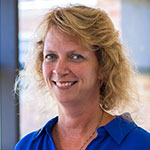 Dr. Buckley often includes a breathing exercise in her classes. She first introduced it while teaching a diabetes elective for third-year pharmacy students in the spring of 2017 — and she saw immediate changes. It made a huge difference “on attitude, on calmness, on collegiality,” she said.
Dr. Buckley often includes a breathing exercise in her classes. She first introduced it while teaching a diabetes elective for third-year pharmacy students in the spring of 2017 — and she saw immediate changes. It made a huge difference “on attitude, on calmness, on collegiality,” she said.
Elizabeth Buckley, Pharm.D., CDE, Associate Professor of Pharmacy at Concordia University-Wisconsin School of Pharmacy
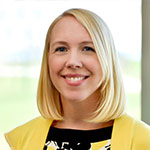 Dr. LaDisa began teaching an improvisational class to first-year students to help bolster communication and teamwork skills. Improv is a theatrical technique where the characters and dialog in scene or story are made up on the spot. Communication skills learned through improv can help a student become a good pharmacist, she noted.
Dr. LaDisa began teaching an improvisational class to first-year students to help bolster communication and teamwork skills. Improv is a theatrical technique where the characters and dialog in scene or story are made up on the spot. Communication skills learned through improv can help a student become a good pharmacist, she noted.
Anne Graff LaDisa, Pharm.D., BCPS, Associate Professor of Pharmacy at Concordia University-Wisconsin School of Pharmacy.